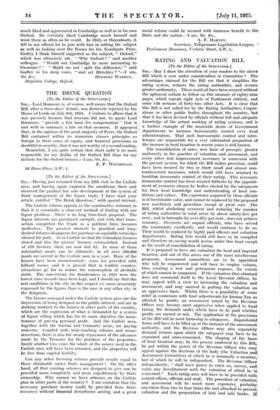[To the Editor of the SPECTATOR.] SIR,—Having just returned from
my fifth visit to the Carlisle area, and having again explored the conditions there and observed the gradual but sure development of the system of State management of the liquor trade, I have read your article, entitled " The Drink Question," with special interest.
The Carlisle scheme appeals to the constructive reformer in that it is essentially a clear-cut method of dealing with our liquor problem. There is no long time-limit proposal. The liquor interests are purchased outright, and with that trans- action completed the Trade as a political force becomes ineffective. The greatest obstacle to practical and long- desired reforms disappears for purchase on equitable terms has cleared the path. So in Carlisle we find the redundant licences closed and also the grocers' licences extinguished. Instead of 119 licences, there are now but 65. In some of these substantial meals can be obtained : in all over 500,000 meals are served in the Carlisle area in a year. Many of the houses have been reconstructed ; some arc provided with billiard rooms, and it is proved that in Carlisle counter- attractions go far to reduce the consumption of alcoholic drink. The convictions for drunkenness in 1924 were the lowest since records have been kept, and I should say that the real conditions of the city in this respect are more accurately expressed by the figures than is the case in any other city in the Kingdom.
The houses managed under the Carlisle system give one the impression of being designed in the public interest, and are in striking contrast to the houses in other parts of the country, which are the expression of what is demanded by a system of liquor selling which has for its main objective the main- tenance of privat, personal profit. And the Carlisle area, together with the Gretna and Cromarty areas, are paying concerns. Coupled with wide-reaching reforms and recon- structions, there is also the steady repayment of the advances made by the Treasury for the purchase of the properties. Inside another two years the whole of the money used in the Carlisle area will have been returned, and the properties will be free from capital liability.
Can any other licensing scheme provide results equal to those obtainable under State Management ? On the other hand, all that existing schemes are designed to give can be provided more completely and more expeditiously by State ownership. Why cannot we have schemes on the Carlisle plan in other parts of the country ? I am confident that the necessary purchase money could be provided from State resources without financial disturbance arising, and a great
social reform could be secured with immense benefit to the State and the nation.—I am, Sir, &c., A. F. HARVEY,
Secretary, Temperance Legislation League. Parliament Mansions, Victoria Street, S.W. 1.


























































 Previous page
Previous page